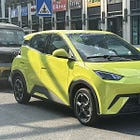China Killing It (Complimentary) In Clean Energy Transition
That's the kind of competition we can get behind.
Hope you’re ready for some remarkably good news on climate: As David Wallace-Wells writes in the New York Times (gift link), forecasts show that long before the rest of the world, China’s greenhouse emissions appear to be peaking, with a decline to follow. The world’s largest country — and for decades, its worst climate bad guy because of All That Coal — is now far ahead of the rest of the world in transitioning away from fossil fuels. The rest of the world is coming along, but if you take China out of the equation, Wallace-Wells writes, “green energy is still moving in the right direction, but much more slowly.”
This feels like one of those articles I’ll be referring back to again and again in coming years; I’ve already put it at the top of my “climate-n-energy” bookmarks.
Wallace-Wells does an impressive job of demonstrating what an impressive job China has been doing with its energy transition, with a number of paragraphs that work like this: “Here’s the world’s total progress in some clean energy technology. Now here’s the world’s progress with China subtracted. Wow, that’s not even close, is it?” Here’s the first of many such comparisons:
Consider solar power, which is presently dominating the global green transition and giving the world its feel-good story. In 2023, the world including China installed 425 gigawatts of new solar power; the world without China installed only 162 gigawatts. China accounted for 263 gigawatts; the United States accounted for just 33.
But it isn’t just the totals; it’s also the astonishing rate at which China is going solar:
As recently as 2019, China was installing about one-quarter of global solar capacity additions; last year, it managed 62 percent more than the rest of the world combined. Over those same five years, China grew its amount of new added capacity more than eight times over; the world without China didn’t even double its rate.
Fortunately for readers, Wallace-Wells is a hell of a good writer, so while the piece is certainly full of data, it never feels like you’re slogging through a list of Chinese clean energy achievements. Along the way, we learn that China is also ahead of the rest of the world in wind and electric vehicles, and that of course Chinese manufacturing is making possible other countries’ energy transitions, too.
And that’s where the happy climate news starts crashing into the fraught territory of international economic competition: China is producing far more solar panels and EVs than can be absorbed by its domestic market, and the US and Europe are trying to protect their own developing green industries through tariffs, like the 100 percent tariff on Chinese EVs that Joe Biden imposed in May; the EU is set to vote later this month on a new 35 percent tariff on Chinese EVs, which would be on top of the existing 10 percent tariff on cars imported from outside the EU.
It’s a hell of a dilemma: If you want the world to get off the fossil fuel teat, then the fastest route would be to get the tech deployed as quickly everywhere as possible. But if that threatens to kill off the US auto industry, the one party that actually gives a shit about clean-energy would most likely be tossed out of office by the nativists and fascists who simply want to keep choking the planet with endless fossil fuels.
The turnaround in Chinese energy policy has been so fast that many people are still fretting about how the rest of the world’s efforts to decarbonize will amount to nothing if China doesn’t get on board. Get China on board? Turns out that China’s driving, losers. And it’s in a compact BYD Seagull EV, which sells for around $10,000 before tariffs, at least in countries where you can get one.
The real challenge, Wallace-Wells suggests, is that while the US is making progress on its energy transition, thanks to the Inflation Reduction Act, we’re already behind our allies on many measures.
Wallace-Wells doesn’t sugar-coat the fact that China remains the world’s biggest carbon polluter, emitting nearly three times as much as the US does annually. China is making huge progress, but goddamn, it has to. On the other hand, he notes that
[In] certain ways this makes China’s green boom even more impressive: The most carbon-hungry economy in world history, during a period of slowing growth short of global “high-income” status, is wagering an enormous amount of its future on nascent energy technologies— and racing well ahead of the global promises it has made about the speed of its own transition. This year, for instance, China hit its 2030 target for total renewable energy six full years early.
So hooray, at least provisionally: China is stepping up to the challenge of the energy transition far more than anyone a decade ago would have predicted, although of course it also has the biggest emissions to tackle, too. The rest of the world is now trying to catch up, but the pace of decarbonization may actually be slowed by America’s “green-tech trade war.”
Wallace-Wells doesn’t offer any easy answers about how the US and other industrial countries can compete, but he does offer this caution:
[A]nother aspect of the imbalance is perhaps more worrying, at least for those of us concerned about the pace of decarbonization: that China might back off, reducing its support for green industry, […] somewhat idling the engine of the global green transition and leaving the rest of us in the lurch.
It’s kind of amazing how the question “What about China?” has changed when we talk about climate. The answer certainly isn’t going to be “drill, drill, drill.”
This is definitely one of those “you have to read the whole thing” stories. You’ve got that gift link, so go ahead and read it twice, and share it with your friends, too.
Yr Wonkette is funded entirely by reader donations. If you can, please become a paid subscriber, or if a one-time donation is more your speed, here’s a speedy link to send us some Ameros.







Solar is too difficult because the sun goes away at night and it doesn’t tell us where it’s going.
If god wanted us to have clean limitless energy he would have put a giant fusion reactor in the sky.